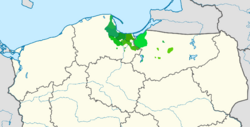Template:Front/featured
| Pomorian language | |
|---|---|
| Pamarėska gålba | |
 | |
| Pronunciation | [/pɑ.ˈma:.reː.skɑ/] |
| Created by | Raistas |
| Setting | Verse:Pamarija |
Indo-European
| |
Early forms | |
The Pomorian language or Pamarėska gålba, język pomorski (in Polish) is a Balto-Slavic language spoken in the region of Pomorze Wschodnie in Northern Poland from Gdynia city to the town of Braniewo, mostly in rural areas. There are at least 20 000 speakers (including second-language speakers knowing the language on an elementary level), of which less than 4000 speak Pomorian natively. Most of the native speakers are at the age of 50 or above, while younger generation usually speaks Polish as their first language.
Ablaut, still productive in Pomorian, was inherited from Proto-Balto-Slavic period. It changes the morphological form of the word. For example "snė͂ge" (older snai͂ges) means "snow", "snigtì" (older "snigteĩ") to snow "snẽdze"(older "snegḗti") "it snows".
There are seven (or six if count the sixth and the seventh as one) noun declensions in Pomorian. Nouns have seven cases: Nominative, Genitive, Dative, Accusative, Instrumental, Locative and Vocative. In Pomorian Proper most nouns have only two numbers: singular and plural, while in Western and Southern dialects there is also a dual number. An interesting feature is using nominative plural only for 3 or 4 items, making it effectively paucal, for example try/cetūri sūnave (three/four sons), but pęči sūnų (five sons) where genitive plural is used instead. However it is not viewed as a separate grammatical number.
Unlike in other Balto-Slavic languages composition in Pomorian is a very productive way to form new words. The process occurs readily in Germanic languages. Along with affixation it is used to create words for describing new meanings and these newly-created words can be very long and thus used mostly in literature. Examples of both composition and affixation are shown in the table below: